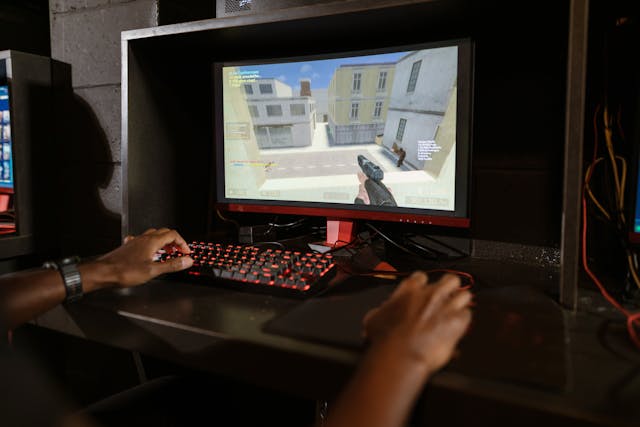For anyone who is at least partially acquainted with financial technology, the fact that digital currencies have been on a wild ride over the past few years is no longer a secret. In little over a decade, crypto has evolved into one of the biggest innovations of the century, changing people’s perspective on money, threatening the supremacy of central banks and revolutionizing the traditional financial system in its rise to fame. If at first only the tech-minded or the wealthy were interested in what this new asset class had to offer, nowadays everyone, from institutional investors to average individuals, seems to be interested in how to buy Bitcoin or to take advantage of the benefits that crypto provides.
However, it’s worth noting that the crypto sector is not the sole thriving industry of recent times. The realm of gaming has also witnessed a remarkable upsurge, particularly amid the pandemic, wherein Microsoft and Sony unveiled staggering growth figures due to gaming becoming a favored pastime during lockdowns. As evidenced by the global video game market’s soaring to $195 billion, this industry is poised for continuous expansion in the foreseeable future. Considering the parallel growth trajectories, rapid advancements, occasional controversies, and their seemingly disparate nature, the convergence of these two domains—crypto and gaming—is unsurprising, ultimately giving birth to the phenomenon known as crypto gaming.
But is the integration of crypto into gaming just another fleeting trend or are crypto games here to stay? You’ll be the judge of that after we provide a more detailed overview of this newly emerged concept and what it entails.
What is crypto gaming?
Since not everyone is a huge fan of video games or a crypto enthusiast, we should start by clarifying the terminology. To put it simply, crypto games are exactly what it says on the tin: games that incorporate different crypto or blockchain elements into their structure. The most popular form of crypto gaming is the play-to-earn model (P2E), popularized by games such as Axie Infinity, The Sandbox, Pegaxy or Decentraland where players can earn crypto rewards or non-fungible tokens (NFTs) by playing their favorite games. These rewards can be traded for other similar assets, sold, or they can be converted into fiat money.
In a way, the inclusion of digital assets into the gaming landscape should be regarded as a natural progression, since the concept of tokenization – as a way to transfer value digitally – was already popular among gamers. The main difference between tokenization in traditional games versus crypto games is related to asset ownership. While crypto games offer payers full ownership of the assets they acquire in a game, be it digital currencies, game characters, tools, weapons, and so on, in conventional games these assets are owned by the developers, and they are only valuable in each specific game environment.
If we analyze things from a broader perspective, the development of crypto games in the context of blockchain technology expansion makes perfect sense. Blockchain has revolutionized nearly every industry and sector, so it was only a matter of time before it would enter the gaming industry. With the introduction of blockchain-based games, gaming underwent a major paradigm shift. If until then all video games followed the traditional centralized model that meant users had no control over their in-game data and assets which were limited to each individual game, blockchain gaming provides a decentralized approach where users have complete control over their data and assets and can use them across a vast network of games.
While decentralization is the common denominator for all crypto games, it can be employed differently, separating these games into two categories: fully decentralized and hybrid. The first category is underpinned by blockchain technology, meaning that any modification to the games’ structure requires community consent, while games in the second category are stored on centralized servers that are fully controlled by game developers or administrators, but the in-game items can be sold, bought and traded freely in a decentralized marketplace.
Crypto gaming vs blockchain gaming
In order to gain a better understanding of what crypto games entail, there’s another important distinction that needs to be clarified. People often use blockchain gaming and crypto gaming to designate the same concept, but there’s a difference between these two terms, at least in theory since in practice the lines tend to get a bit blurry.
In simple words, blockchain gaming puts concepts such as decentralization, asset ownership and immutability into the spotlight. Each action that users perform in the game environment is recorded on the blockchain, which serves as a decentralized public ledger that no single entity controls, thus removing any need for third-party implication. In this case, the emphasis is on the enhanced freedom and security that these gems provide, not on the financial aspects. Crypto games, on the other hand, center on digital assets that can be earned by playing these games.
Benefits and prospects for the future
There are different ways to make a profit by playing crypto games. Users can purchase tokens or different assets such as characters, tools, virtual land, costumes, or weapons, in the early stages of a game and then sell them for a higher price when the game becomes more popular.
Crypto games also offer the possibility to earn money through advertising or by trading the assets you’ve earned during the game for fiat. Players can get a hold of valuable in-game items by performing all sorts of actions such as going on a mission, fighting with an opponent, completing a level, or spending a certain amount of time playing.
Obviously, the main benefit of the play-to-earn gaming model is the opportunity to earn money while enjoying a pleasant pastime. But this concept is equally gratifying for developers who get to boost their earnings with the expansion of the P2E sector. At a broader level, the development and popularization of crypto games also pave the path for greater crypto adoption, which according to analysts is the direction where things are headed.
As both the crypto and gaming industries continue to evolve, the convergence of these two worlds presents a unique and intriguing landscape that’s bound to shape the entertainment and financial sectors in unprecedented ways. The future holds exciting possibilities for crypto gaming, whether it’s in the form of innovative gameplay experiences, new economic models, or further integration of blockchain technology. Only time will reveal the extent of the impact this fusion will have on the way we play, earn, and interact with digital assets.







Leave a Reply